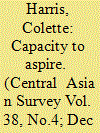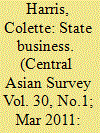| Srl | Item |
| 1 |
ID:
169264


|
|
|
|
|
| Summary/Abstract |
Rather than studying young men's career- and/or economic-based aspirations, this article explores the obstacles that hinder youths of both sexes in gerontocratic southern Tajikistan and North India from developing the capacity to make their own life choices. Focusing mainly on the selection of marital partner and largely on women, I explore the narratives of those who have never even dreamed of a good life, of others who have dreamed but been unable to actualize their dreams, of a few who have started to plan the way forward, and of a tiny number who actually managed to achieve their aspirations, teasing out the influences that facilitate this. I suggest that even educated youths with some control over their public lives are constricted by their family relations and that it requires quite specific support to defy one’s family, which can create significant vulnerabilities in settings with no other safety net.
|
|
|
|
|
|
|
|
|
|
|
|
|
|
|
|
| 2 |
ID:
104063


|
|
|
|
|
| Publication |
2011.
|
| Summary/Abstract |
This article examines the relation of the state to masculinity and sexuality by way of an exploration of the sexual problems of a young man and his wife in Tajikistan at the end of the Soviet era. It suggests that the regime's inattention to this kind of issue was bound up with the importance to the state of projecting appropriate versions of masculinity. It further posits the idea that the continued refusal of the independent Tajik state to offer appropriate treatments for sexual dysfunction is consistent with the image of modernity President Rahmon wishes to present to the world. The article shows that as masculinity discursively occupies the superior gender position, with men expected to dominate, the state is itself impotent to respond when they are, in fact, unable to do so in sexual practice. However, the myth of male dominance persists to the point that it may prevent women from seeing beyond their subordination and finding mutually beneficial solutions in their familial and sexual relationships.
|
|
|
|
|
|
|
|
|
|
|
|
|
|
|
|